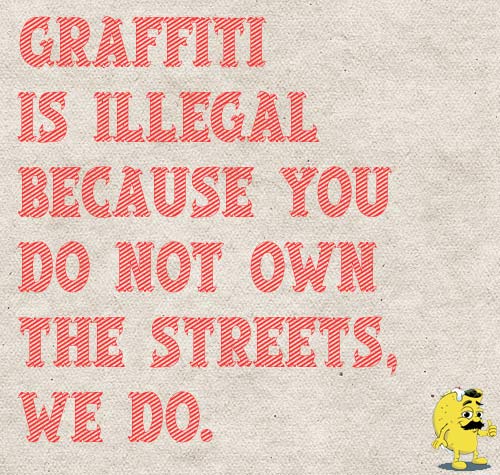
A local newspaper reports on AB2609, which, in part, requires people convicted of graffiti-related crimes keep clean the area they're convicted clean and free of additional tagging or graffiti. The law was introduced by LA rep. Mike Davis. Here is the text of the bill:
AB 2609, Davis. Vandalism: penalties: community service.
Existing law, amended by Proposition 21, an initiative measure
enacted by voters at the March 7, 2000, statewide primary election,
and requiring a 2/3 vote of the Legislature to amend, makes a person
who maliciously commits specified destructive acts with respect to
another's property guilty of vandalism. Existing law grants the court
the authority to order a defendant who is convicted of violating
this provision, or to order the defendant and his or her parents, if
the defendant is a minor, to clean up, repair, or replace the damaged
property or keep the damaged property or another specified property
in the community free of graffiti for up to one year.
This bill would, in addition, require a court, when appropriate
and feasible, to impose the above cleanup penalties for any defendant
who was convicted of violating those vandalism provisions, as
specified. By increasing the penalties for a crime, the bill would
impose a state-mandated local program.
The California Constitution requires the state to reimburse local
agencies and school districts for certain costs mandated by the
state. Statutory provisions establish procedures for making that
reimbursement.
This bill would provide that no reimbursement is required by this
act for a specified reason.THE PEOPLE OF THE STATE OF CALIFORNIA DO ENACT AS FOLLOWS:
SECTION 1. Section 594 of the Penal Code is amended to read:
594. (a) Every person who maliciously commits any of the
following acts with respect to any real or personal property not his
or her own, in cases other than those specified by state law, is
guilty of vandalism:
(1) Defaces with graffiti or other inscribed material.
(2) Damages.
(3) Destroys.
Whenever a person violates this subdivision with respect to real
property, vehicles, signs, fixtures, furnishings, or property
belonging to any public entity, as defined by Section 811.2 of the
Government Code, or the federal government, it shall be a permissive
inference that the person neither owned the property nor had the
permission of the owner to deface, damage, or destroy the property.
(b) (1) If the amount of defacement, damage, or destruction is
four hundred dollars ($400) or more, vandalism is punishable by
imprisonment in the state prison or in a county jail not exceeding
one year, or by a fine of not more than ten thousand dollars
($10,000), or if the amount of defacement, damage, or destruction is
ten thousand dollars ($10,000) or more, by a fine of not more than
fifty thousand dollars ($50,000), or by both that fine and
imprisonment.
(2) (A) If the amount of defacement, damage, or destruction is
less than four hundred dollars ($400), vandalism is punishable by
imprisonment in a county jail not exceeding one year, or by a fine of
not more than one thousand dollars ($1,000), or by both that fine
and imprisonment.
(B) If the amount of defacement, damage, or destruction is less
than four hundred dollars ($400), and the defendant has been
previously convicted of vandalism or affixing graffiti or other
inscribed material under Section 594, 594.3, 594.4, 640.5, 640.6, or
640.7, vandalism is punishable by imprisonment in a county jail for
not more than one year, or by a fine of not more than five thousand
dollars ($5,000), or by both that fine and imprisonment.
(c) Upon conviction of any person under this section for acts of
vandalism consisting of defacing property with graffiti or other
inscribed materials, the court shall, when appropriate and feasible,
in addition to any punishment imposed under subdivision (b), order
the defendant to clean up, repair, or replace the damaged property
himself or herself, or order the defendant, and his or her parents or
guardians if the defendant is a minor, to keep the damaged property
or another specified property in the community free of graffiti for
up to one year. Participation of a parent or guardian is not required
under this subdivision if the court deems this participation to be
detrimental to the defendant, or if the parent or guardian is a
single parent who must care for young children. If the court finds
that graffiti cleanup is inappropriate, the court shall consider
other types of community service, where feasible.
(d) If a minor is personally unable to pay a fine levied for acts
prohibited by this section, the parent of that minor shall be liable
for payment of the fine. A court may waive payment of the fine, or
any part thereof, by the parent upon a finding of good cause.
(e) As used in this section, the term "graffiti or other inscribed
material" includes any unauthorized inscription, word, figure, mark,
or design, that is written, marked, etched, scratched, drawn, or
painted on real or personal property.
(f) The court may order any person ordered to perform community
service or graffiti removal pursuant to paragraph (1) of subdivision
(c) to undergo counseling.
(g) This section shall become operative on January 1, 2002.
SEC. 2. No reimbursement is required by this act pursuant to
Section 6 of Article XIII B of the California Constitution because
the only costs that may be incurred by a local agency or school
district will be incurred because this act creates a new crime or
infraction, eliminates a crime or infraction, or changes the penalty
for a crime or infraction, within the meaning of Section 17556 of the
Government Code, or changes the definition of a crime within the
meaning of Section 6 of Article XIII B of the California
Constitution.






